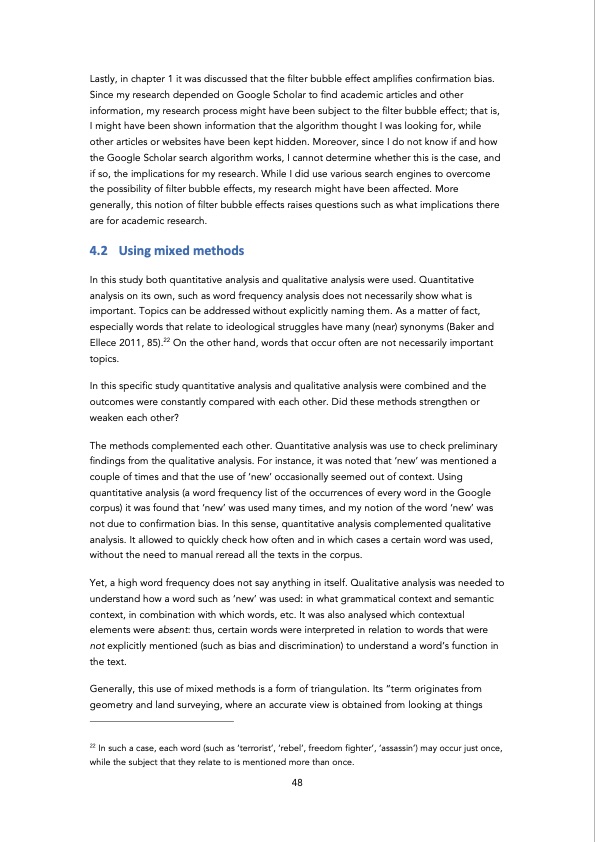
PDF Publication Title:
Text from PDF Page: 048
Lastly, in chapter 1 it was discussed that the filter bubble effect amplifies confirmation bias. Since my research depended on Google Scholar to find academic articles and other information, my research process might have been subject to the filter bubble effect; that is, I might have been shown information that the algorithm thought I was looking for, while other articles or websites have been kept hidden. Moreover, since I do not know if and how the Google Scholar search algorithm works, I cannot determine whether this is the case, and if so, the implications for my research. While I did use various search engines to overcome the possibility of filter bubble effects, my research might have been affected. More generally, this notion of filter bubble effects raises questions such as what implications there are for academic research. 4.2 Using mixed methods In this study both quantitative analysis and qualitative analysis were used. Quantitative analysis on its own, such as word frequency analysis does not necessarily show what is important. Topics can be addressed without explicitly naming them. As a matter of fact, especially words that relate to ideological struggles have many (near) synonyms (Baker and Ellece 2011, 85).22 On the other hand, words that occur often are not necessarily important topics. In this specific study quantitative analysis and qualitative analysis were combined and the outcomes were constantly compared with each other. Did these methods strengthen or weaken each other? The methods complemented each other. Quantitative analysis was use to check preliminary findings from the qualitative analysis. For instance, it was noted that ‘new’ was mentioned a couple of times and that the use of ‘new’ occasionally seemed out of context. Using quantitative analysis (a word frequency list of the occurrences of every word in the Google corpus) it was found that ‘new’ was used many times, and my notion of the word ‘new’ was not due to confirmation bias. In this sense, quantitative analysis complemented qualitative analysis. It allowed to quickly check how often and in which cases a certain word was used, without the need to manual reread all the texts in the corpus. Yet, a high word frequency does not say anything in itself. Qualitative analysis was needed to understand how a word such as ‘new’ was used: in what grammatical context and semantic context, in combination with which words, etc. It was also analysed which contextual elements were absent: thus, certain words were interpreted in relation to words that were not explicitly mentioned (such as bias and discrimination) to understand a word’s function in the text. Generally, this use of mixed methods is a form of triangulation. Its “term originates from geometry and land surveying, where an accurate view is obtained from looking at things 22 In such a case, each word (such as ‘terrorist’, ‘rebel’, freedom fighter’, ‘assassin’) may occur just once, while the subject that they relate to is mentioned more than once. 48PDF Image | peek into the discursive construction of the Google Search Algorithm: A critical discourse analysis

PDF Search Title:
peek into the discursive construction of the Google Search Algorithm: A critical discourse analysisOriginal File Name Searched:
thesis-google-search-algotithm.pdfDIY PDF Search: Google It | Yahoo | Bing
Cruise Ship Reviews | Luxury Resort | Jet | Yacht | and Travel Tech More Info
Cruising Review Topics and Articles More Info
Software based on Filemaker for the travel industry More Info
The Burgenstock Resort: Reviews on CruisingReview website... More Info
Resort Reviews: World Class resorts... More Info
The Riffelalp Resort: Reviews on CruisingReview website... More Info
| CONTACT TEL: 608-238-6001 Email: greg@cruisingreview.com | RSS | AMP |